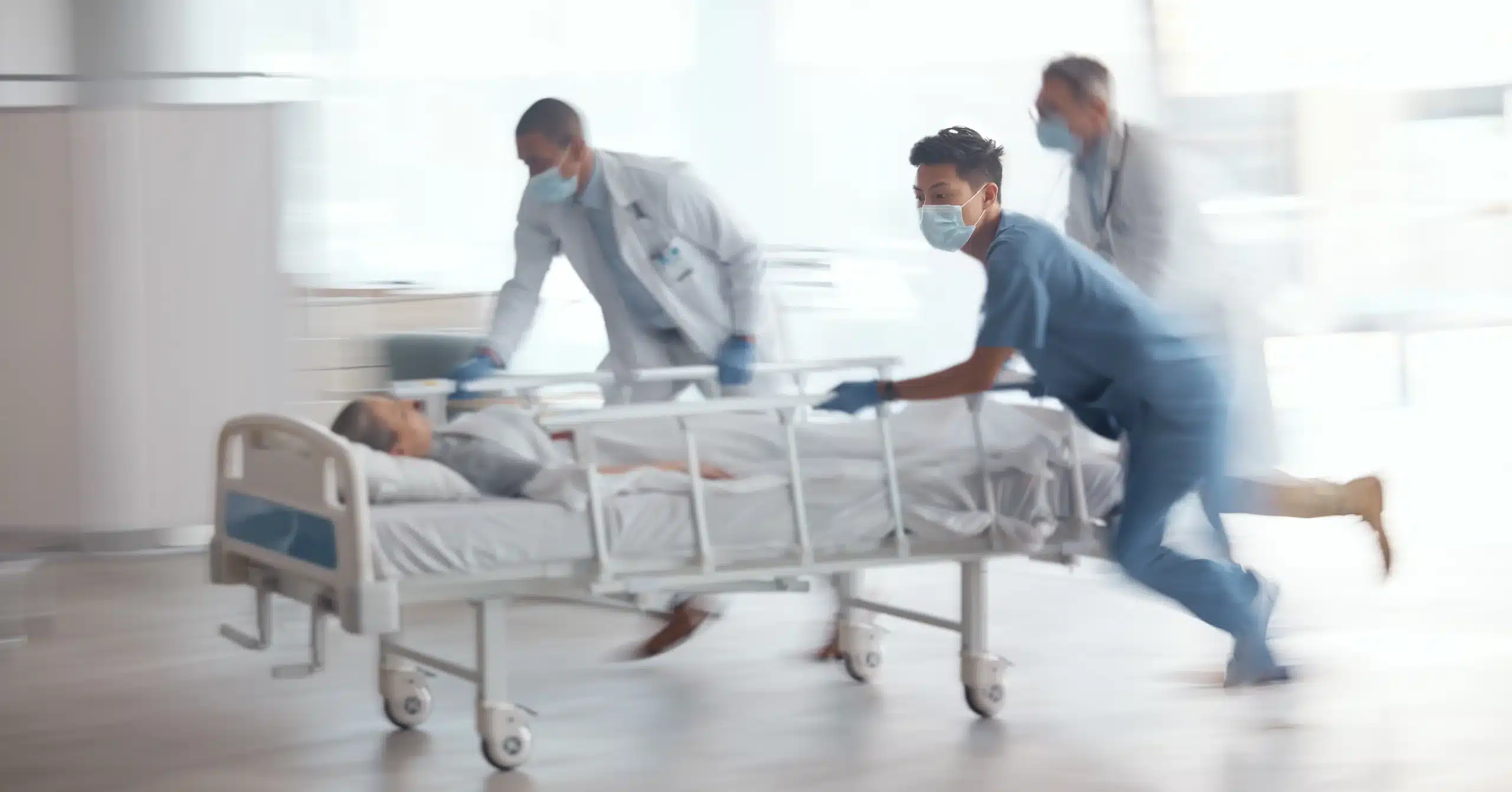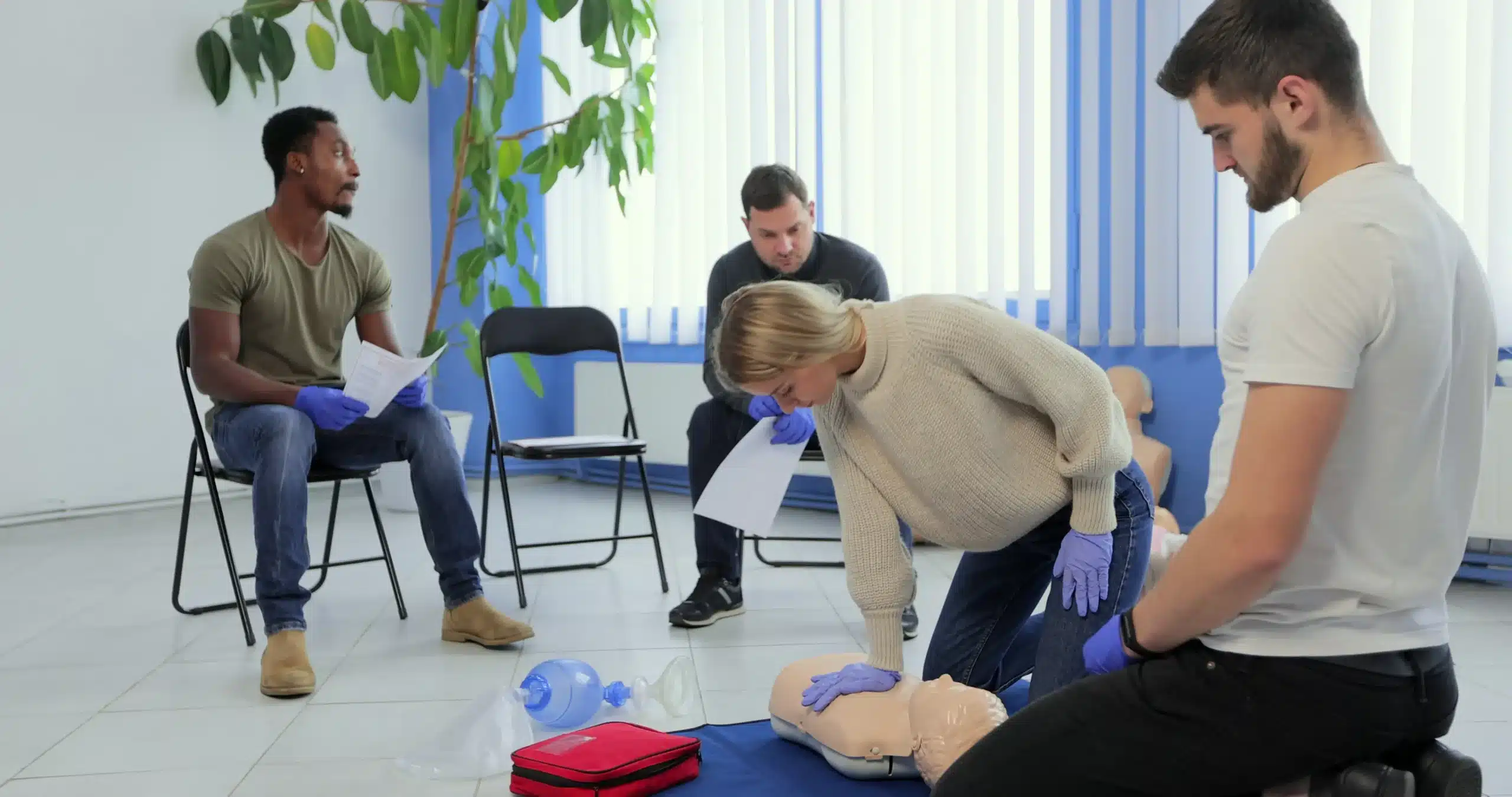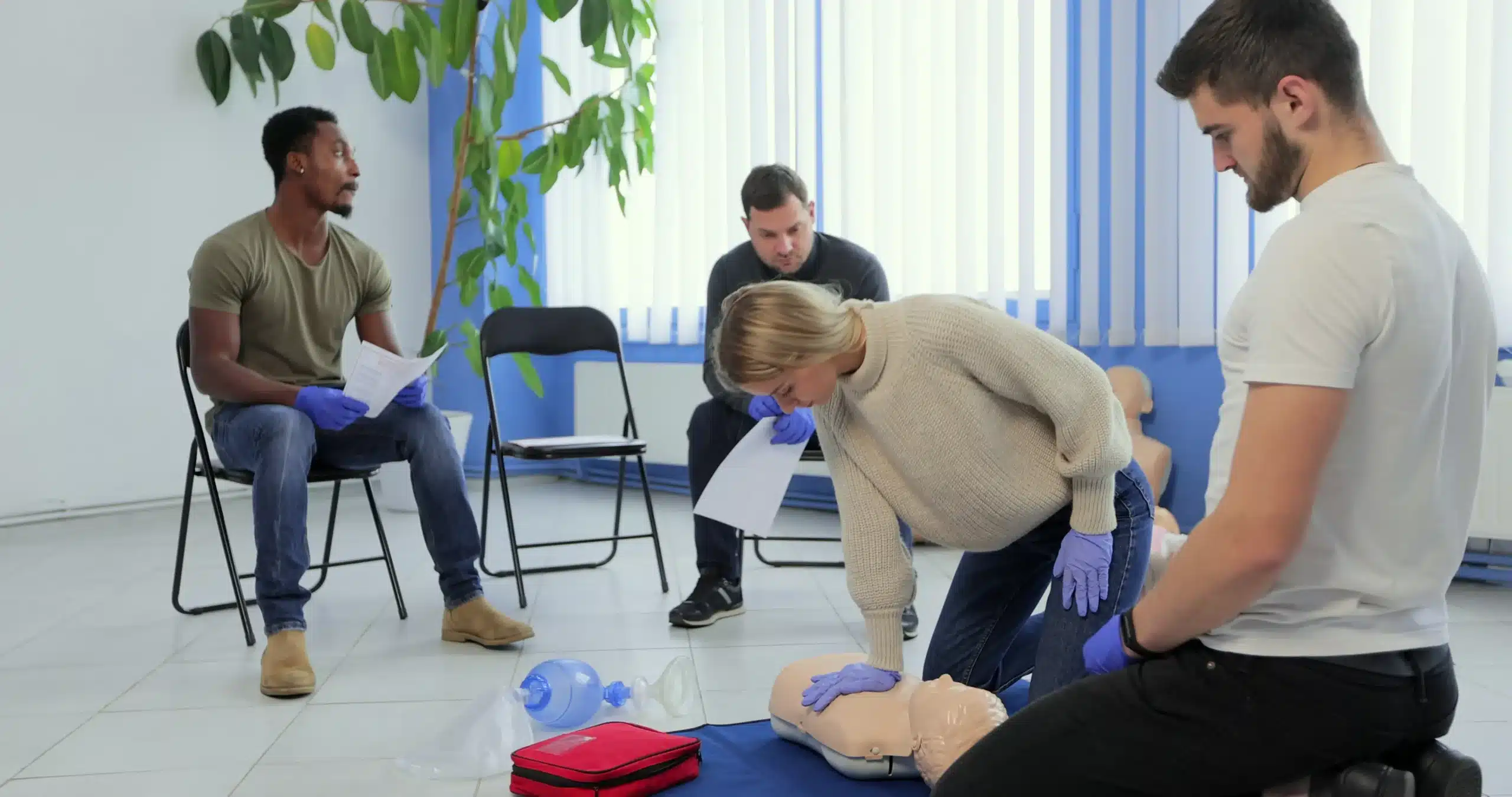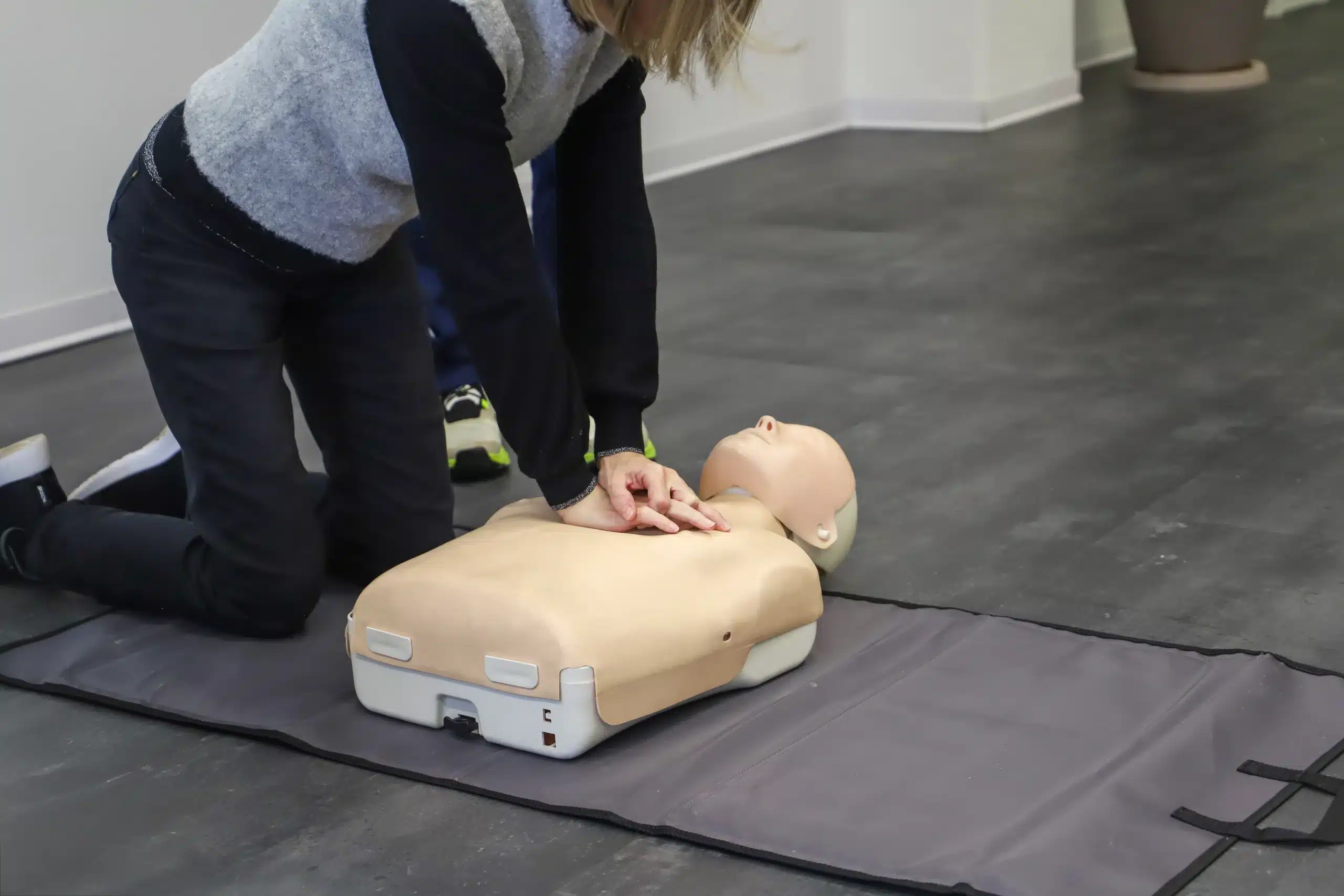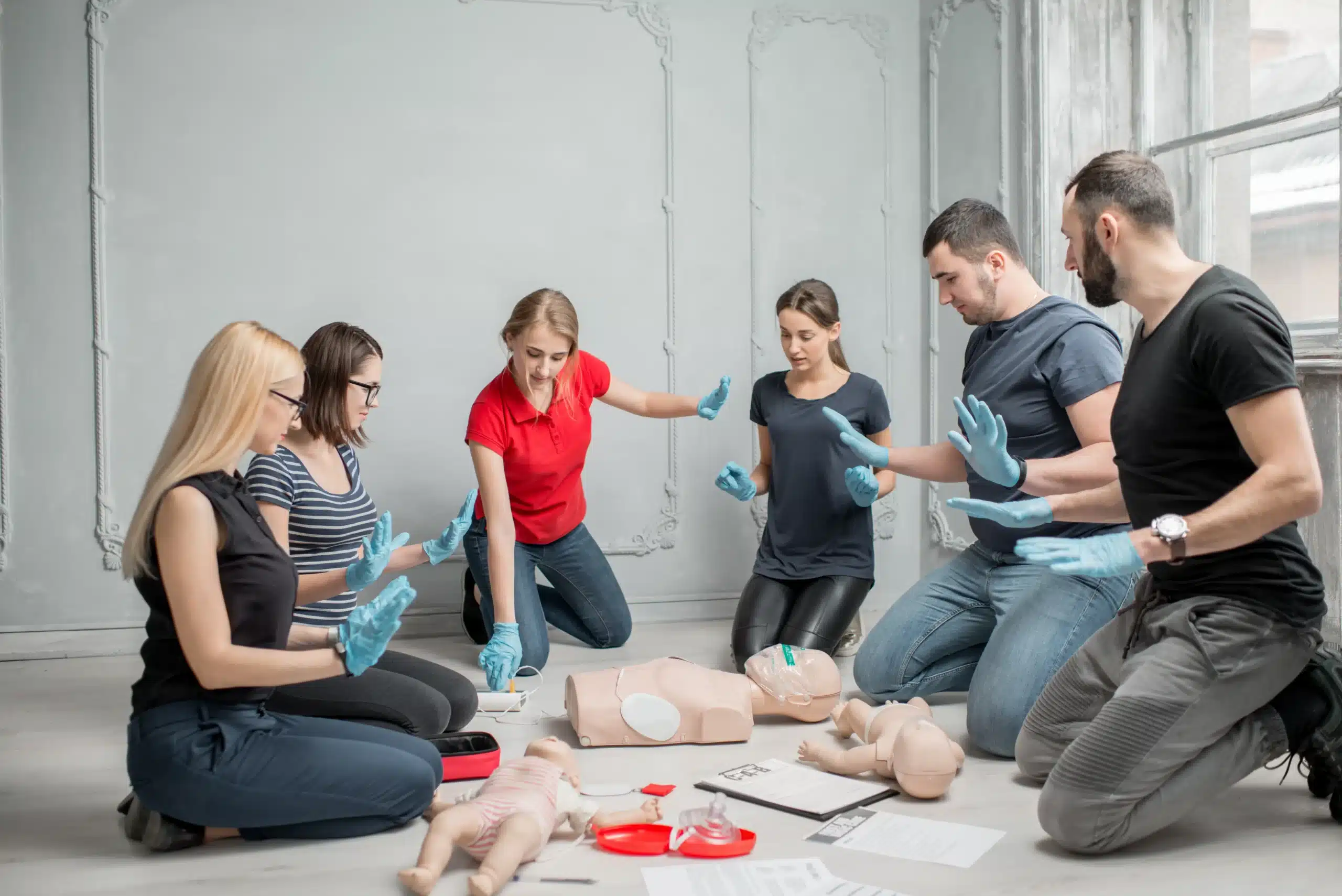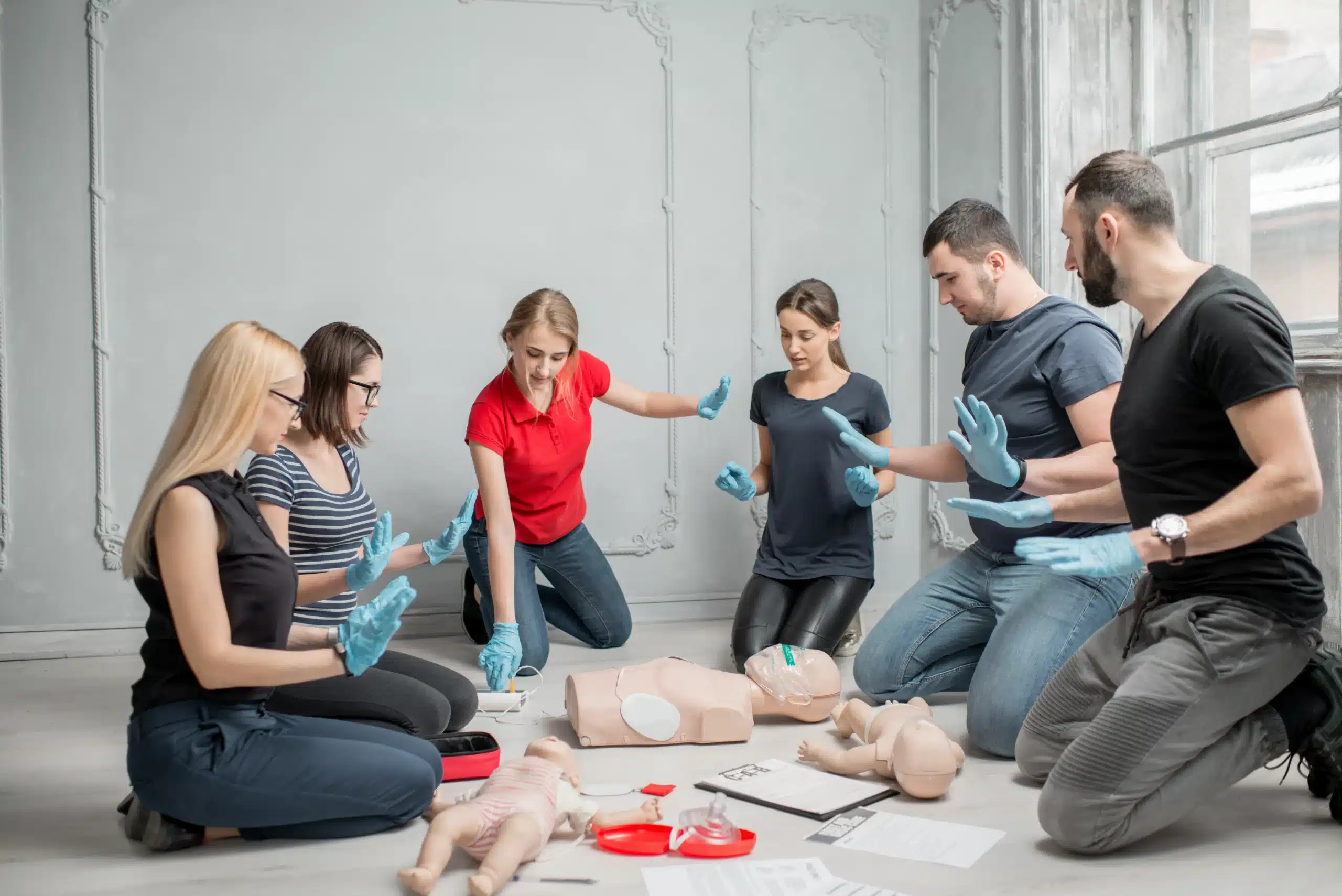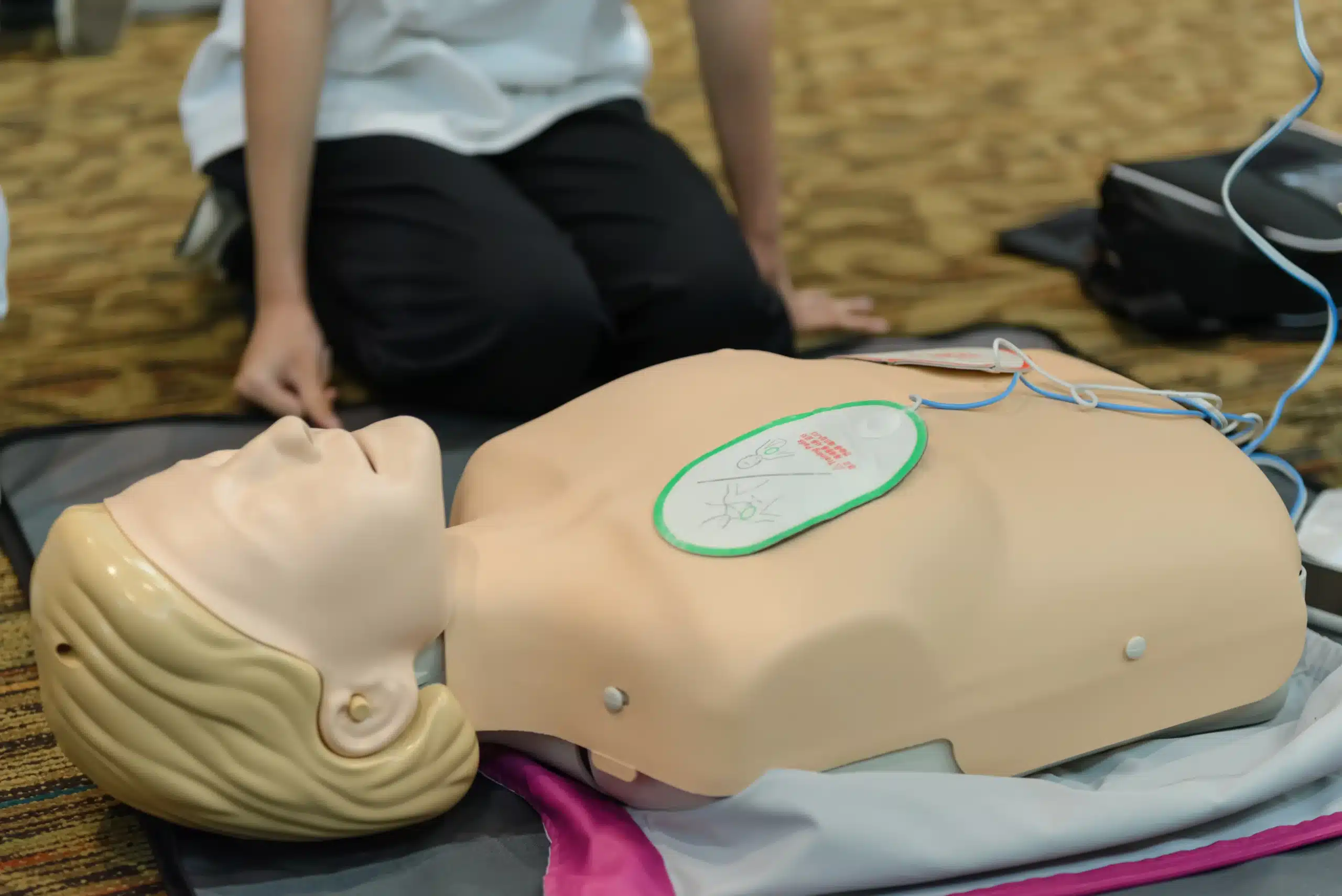Life is unpredictable, but with the right training, you can be prepared for anything. This guide is your go-to resource for CPR certification in San Jose, providing you with the knowledge and resources to choose the right course and provider. Whether you’re seeking CPR certification in San Jose for professional advancement or personal growth, understanding the landscape of available courses and training centers is essential. We’ll break down the different types of CPR certifications, discuss the costs and benefits of each, and offer insights into what to expect during a CPR class. We’ll also highlight reputable training providers in San Jose, such as Safety Training Seminars, known for its convenient schedules and experienced instructors.
Key Takeaways
- Find the right CPR class for you: Consider your individual needs and career path when choosing a CPR certification, ranging from basic CPR/AED training to advanced certifications like ACLS and PALS.
- Understand CPR class costs and options: Explore the various CPR class formats available, including in-person, blended, and online options, to find a learning style that suits you. Also, research typical costs and look for potential discounts.
- CPR certification is an ongoing commitment: Maintain your skills and knowledge by renewing your certification every two years and staying updated on the latest guidelines through continuing education opportunities.
What is CPR Certification in San Jose?
CPR certification in San Jose gives you the skills to respond to cardiac and breathing emergencies. Organizations like the American Heart Association (AHA) and the American Red Cross offer these certifications, teaching life-saving techniques for adults, children, and infants. You’ll learn chest compressions, rescue breaths, and how to use an Automated External Defibrillator (AED). CPR certification is usually valid for two years, after which a renewal course is needed. Several providers in San Jose offer these courses, including Safety Training Seminars, which specializes in AHA courses such as BLS, ACLS, PALS, CPR, and First Aid. These classes build confidence, preparing you to act quickly and effectively in emergencies. Whether you’re a healthcare worker, teacher, parent, or just someone who wants to learn these essential skills, CPR certification empowers you to help in a crisis.
CPR Certification Classes: What are Your Options?
Choosing the right CPR certification depends on your individual needs and career path. Here’s a breakdown of common CPR certification classes available in San Jose:
Basic Life Support (BLS)
The BLS certification course covers core life-saving skills for healthcare providers. These skills include CPR, AED use, and relief of choking, with an emphasis on teamwork and high-quality CPR. This course is essential for professionals like doctors, nurses, paramedics, and other healthcare personnel. AllCPR San Jose states that BLS courses are “designed to give you the confidence and skills to respond during an emergency,” making it a valuable asset in any healthcare setting.
Advanced Cardiovascular Life Support (ACLS)
ACLS certification goes beyond the basics, equipping healthcare professionals with the knowledge to manage cardiovascular emergencies and respiratory arrest. It involves advanced interventions, pharmacology, and team dynamics. Safety Training Seminars, a trusted provider in San Jose, offers ACLS training as part of their comprehensive program. Their website highlights their commitment to providing “high quality American Heart Association … ACLS … courses.” This advanced training is crucial for those working in critical care.
Pediatric Advanced Life Support (PALS)
PALS certification focuses on the specialized needs of infants and children facing respiratory emergencies and cardiac arrest. It covers pediatric assessment, resuscitation techniques, and effective team communication. Safety Training Seminars offers PALS training in downtown San Jose, ensuring convenient access. Bay Area CPR confirms that Safety Training Seminars “offers American Heart Association … PALS courses in Downtown San Jose, CA,” making them a reliable resource for this specialized certification.
Heartsaver CPR/AED
Heartsaver courses teach CPR and AED use to anyone who wants to learn, not just healthcare professionals. These courses empower individuals to respond effectively to emergencies in various settings, from homes and workplaces to community centers. Whether you’re a teacher, parent, or simply want to be prepared, a Heartsaver CPR/AED certification can make a difference. AllCPR San Jose points out that these courses are ideal for “someone looking to enhance their life-saving skills.”
First Aid Certification
While not strictly CPR, first aid certification is a valuable addition to any CPR training. It equips you with the skills to manage injuries, illnesses, and other medical emergencies, allowing you to provide immediate care until professional medical help arrives. Consider pairing first aid and CPR training for a well-rounded approach to emergency preparedness.
CPR Certification: How Much Does it Cost?
CPR certification costs in San Jose vary depending on the course type and provider. Understanding typical price ranges and available discounts helps you budget effectively. Let’s break down the costs associated with different CPR certification levels.
BLS Certification Costs
Basic Life Support (BLS) certification is a foundational course for healthcare providers and other professionals. BLS certification covers essential life-saving skills, including CPR, AED use, and relief of choking. In San Jose, BLS certification typically costs between $75 and $100. Factors influencing price include the training provider, course format (in-person or blended learning), and included materials. Compare prices to find the best value. Safety Training Seminars offers a low price guarantee, ensuring quality training at a competitive price.
ACLS and PALS Certification Costs
Advanced Cardiovascular Life Support (ACLS) and Pediatric Advanced Life Support (PALS) certifications are specialized courses for healthcare professionals managing cardiopulmonary emergencies. These courses build upon BLS foundations and cover more complex algorithms and interventions, often incorporating team dynamics and pharmacology. Consequently, ACLS and PALS certifications typically cost more than BLS, ranging from $150 to $250 or more in San Jose.
Considering Additional Fees
When budgeting, consider potential additional fees. Some providers charge extra for course materials, certification cards, or online access. Inquire about all costs upfront. At Safety Training Seminars, we prioritize transparent pricing and offer comprehensive training packages. Contact us to learn more about our courses and pricing.
Group Discounts and Promotions
Many CPR training providers offer group discounts. If you need to certify multiple people, a group discount can significantly reduce costs. Also, look for promotional offers or seasonal discounts. Contacting providers or checking their websites can reveal potential savings. Safety Training Seminars frequently offers promotions and group discounts, making our training accessible. Our streamlined RQI program is especially convenient for busy professionals and groups.
CPR Course Structure: What to Expect
Knowing what to expect can help you feel prepared and confident going into your CPR class. Whether you choose an in-person, blended, or online course, the goal is to equip you with the lifesaving skills you need.
In-Person Classes
In-person CPR classes offer a structured learning environment. You’ll work directly with a certified instructor and interact with other students, allowing for real-time feedback and a sense of community. This format is ideal for those who thrive in a traditional classroom setting and appreciate direct interaction. Instructors can demonstrate techniques and provide personalized guidance, ensuring you grasp the core concepts.
Online and Blended Learning
For those seeking more flexibility, online and blended learning options are available. Blended learning combines online coursework with in-person skills sessions. This approach lets you learn the theoretical material at your own pace before practicing hands-on skills with an instructor. Fully online courses offer even greater flexibility, allowing you to complete the entire course from home.
Hands-On Practice
Regardless of the format, hands-on practice is a critical component of any CPR course. You’ll work with mannequins to simulate real-life scenarios, practicing chest compressions, rescue breaths, and other essential techniques. This practical experience builds muscle memory and confidence, preparing you to respond effectively in an emergency. Many courses also provide access to online resources and manuals to reinforce your learning.
Skills Assessment and Testing
To receive your CPR certification, you’ll need to demonstrate your proficiency through a skills assessment. This typically involves performing CPR on a mannequin while the instructor evaluates your technique. Upon successful completion, you’ll receive your certification, validating your skills and knowledge. Some providers offer same-day certification. For busy professionals, some centers offer expedited skills check sessions, especially for those who have completed the online portion of a blended learning course.
CPR Instructors: What are Their Qualifications?
Choosing the right CPR class is a big decision. You want to feel confident in your instructor’s abilities, so you know you’re getting high-quality training. What should you look for in a CPR instructor? This section breaks down the qualifications and qualities that make a great CPR instructor.
Typical Instructor Backgrounds
CPR instructors often have healthcare backgrounds. You’ll find instructors who are nurses, paramedics, EMTs, or other medical professionals. Their real-world experience adds a valuable layer to the training, allowing them to share practical insights and answer your questions from a place of first-hand knowledge. Many instructors also have specialized certifications beyond basic CPR instruction, such as ACLS (Advanced Cardiovascular Life Support) or PALS (Pediatric Advanced Life Support). This breadth of experience ensures they can handle a wide range of scenarios and learning styles. For example, Safety Training Seminars instructors are certified by the American Heart Association.
Instructor Certification Requirements
CPR instructors undergo rigorous training and certification processes. Organizations like the American Heart Association set specific standards for instructor certification. These standards ensure instructors deeply understand CPR techniques, proper use of AEDs (automated external defibrillators), and effective teaching methodologies. Instructors must demonstrate proficiency in performing CPR and show they can effectively communicate these skills to others. This standardized approach helps maintain the quality and consistency of CPR training across different providers. You can often find information about an instructor’s certifications on the training center’s website. CPR and First Aid training is an essential skill.
How Quality Instruction Impacts Training
A skilled CPR instructor can make all the difference in your learning experience. Look for instructors who create a supportive and engaging learning environment. Hands-on practice is crucial for mastering CPR, so a good instructor will prioritize this aspect of the training. They’ll provide ample opportunities to practice on mannequins and give you personalized feedback to help you refine your technique. Clear communication and a patient approach are also essential. A good instructor will explain complex concepts in a way that’s easy to understand and will be happy to answer any questions. Ultimately, quality instruction empowers you to feel confident and prepared to use your CPR skills in a real-life emergency. Contact us today to learn more about our CPR classes.
Top CPR Certification Providers in San Jose
Finding the right CPR certification provider is essential. Here’s a rundown of reputable options in San Jose:
Safety Training Seminars
Safety Training Seminars offers various American Heart Association (AHA) courses, including BLS, ACLS, PALS, CPR, and First Aid. They focus on providing convenient and affordable options. Check their website for their course schedule and registration information. They also offer the RQI program for a more flexible BLS recertification process.
American Red Cross
The American Red Cross provides CPR and First Aid training. Their San Jose chapter offers various courses, including in-person and blended online learning. Visit the Red Cross website for course details and schedules. Their OSHA-compliant classes are a solid choice for workplace certification.
American Heart Association Training Centers
Several AHA Training Centers operate in San Jose, offering standardized curriculum and certification. The Emergency and Health Training Center is one example, providing BLS, ACLS, PALS, and other AHA courses. These centers often emphasize hands-on training.
Emergency and Health Training Center
The Emergency and Health Training Center offers AHA-certified courses in English, Spanish, and Vietnamese. They focus on hands-on learning and have instructors with EMT and medical backgrounds. Learn more about their courses and schedule on their website.
Local Hospitals and Medical Centers
Many San Jose hospitals and medical centers offer CPR training to healthcare professionals and the public. Check with hospitals like Good Samaritan Hospital, Regional Medical Center of San Jose, or O’Connor Hospital for information on their courses. These courses are often a good option for those seeking training from experienced medical professionals. For additional resources, check out this helpful guide to CPR certification in San Jose.
Schedule Your CPR Class
Finding the right CPR class is easier than you think, especially with the flexible options available in San Jose. Whether you’re a busy professional, a student, or a parent, you can find a course that fits your schedule. Let’s explore some of the ways you can find a time that works for you.
Flexible Class Times
Many CPR training centers understand the demands of a busy schedule. That’s why they offer classes throughout the week, including weekdays, to accommodate various needs. Safety Training Seminars offers courses seven days a week, making it easier to find a time that works. This flexibility ensures that you can get certified without disrupting your work or personal commitments. Check with your chosen provider for their specific weekly schedule and find a class that seamlessly integrates into your routine.
Weekend and Evening Options
If weekdays are out of the question, weekend and evening classes are a great alternative. These options cater to those who work traditional hours or have other commitments during the week. Providers often offer weekend CPR courses, allowing you to get certified on your own time. Evening classes are also a popular choice, providing a convenient option after a typical workday. Contact your chosen training center to see what evening options they have available.
Group Training
Group training is a smart choice for businesses, schools, or community groups looking to certify multiple people at once. It’s often more cost-effective and allows for a shared learning experience. Some providers offer group discounts, making it an even more attractive option. Contact your preferred training center to discuss group rates and scheduling options. They can often tailor a class to meet your specific group’s needs.
On-Site Training
For larger groups or organizations, on-site training offers the ultimate convenience. The CPR instructors come to you, eliminating the need for travel and allowing for training in a familiar environment. This option is particularly beneficial for businesses wanting to train their entire staff simultaneously. Reach out to your chosen CPR provider to inquire about on-site training availability and customize a program that works best for your organization. They can often work with you to develop a curriculum that addresses your specific industry or workplace requirements.
Maintain Your CPR Certification
CPR certification isn’t a one-time thing. Staying current with the latest guidelines and techniques is crucial for providing effective care in emergencies. This section covers how to maintain your CPR certification and why it matters.
Renew Your Certification
CPR certifications, like those for BLS, are typically valid for two years. Before your certification expires, sign up for a renewal course. This process ensures your skills are sharp and you’re ready to respond confidently in a crisis. Check with your certifying organization, such as the American Heart Association or the American Red Cross, for specific renewal requirements. Safety Training Seminars offers a variety of renewal courses, including our convenient RQI program, designed for a fast and efficient certification process.
Continuing Education
Even if your certification isn’t due for renewal yet, consider taking continuing education courses. These courses offer refreshers on essential skills and introduce any updated guidelines or protocols. Continuing education demonstrates your commitment to providing high-quality care and helps you maintain confidence in your abilities. Plus, many providers, like Safety Training Seminars, design their CPR training to be engaging and hands-on, making learning a valuable and enjoyable experience.
Stay Current: Why It Matters
Staying current with CPR guidelines and techniques is paramount. Medical knowledge and best practices are constantly evolving. Regularly updating your skills ensures you’re using the most effective methods in an emergency. Maintaining your certification demonstrates your commitment to providing the highest standard of care, especially important for healthcare professionals and those in roles requiring CPR certification. Staying current can also boost your confidence and reduce hesitation in a critical situation. Knowing you have the most up-to-date skills can make a significant difference. The American Heart Association regularly reviews and updates its guidelines, emphasizing the importance of ongoing training. For residents of Northern California, Safety Training Seminars offers a comprehensive directory of CPR resources to help you stay informed and connected. We also offer a low price guarantee, making it easier for you to access the training you need.
Benefits of CPR Certification in San Jose
Getting CPR certified offers numerous advantages, both personal and professional. Whether you live in San Jose or are just visiting, having these skills can make a real difference.
Be Prepared
CPR training equips you with the skills to respond effectively in emergencies. You’ll learn to recognize the signs of a cardiac arrest and provide immediate assistance, whether at home, work, or out and about. Knowing CPR can give you the confidence to act quickly and potentially save a life. For CPR training in San Jose, check out the courses offered by Safety Training Seminars.
Advance Your Career
CPR certification is often a requirement for healthcare jobs. Even if it’s not mandatory, listing this credential on your resume can give you an edge, showing your commitment to patient safety. It can open doors to new opportunities and advance your career. Learn more about BLS certification at Safety Training Seminars.
Impact Your Community
Becoming CPR certified means you’re not just prepared for individual emergencies; you’re also contributing to a safer community. When more people are trained, the chances of someone receiving timely assistance during a cardiac event increase. You become a valuable resource, able to help until professional medical help arrives. Explore the Northern California CPR directory for additional resources.
Network with Peers
CPR classes offer a chance to connect with others who share a passion for health and safety. You’ll meet people from diverse backgrounds, creating valuable networking opportunities. Contact Safety Training Seminars to learn about upcoming classes and connect with your community.
Choose the Right CPR Certification
Finding the right CPR certification boils down to three things: understanding your needs, comparing available courses, and verifying the legitimacy of the provider. Taking the time to do your research beforehand means you’ll walk away with the right skills and a valid certification.
Assess Your Needs
Before you jump into a CPR class, think about why you need this certification. Are you required to have a specific certification for your job as a healthcare provider, or are you taking a CPR course for personal enrichment? Knowing this will help you narrow down your options. Also, consider your budget. CPR class costs vary, so doing some preliminary research on typical price ranges and available discounts (Safety Training Seminars offers a low price guarantee) can help you plan.
Compare Courses
CPR certification costs can differ based on the provider and the type of course. For example, a basic CPR/AED course will likely cost less than an Advanced Cardiovascular Life Support (ACLS) class. Look at what each course covers. Some courses, like the American Heart Association BLS course, are designed specifically for healthcare providers and cover a broader range of skills. Take the time to compare different courses to find one that aligns with both your needs and your budget. You can find a helpful directory of CPR training centers in Northern California on the Safety Training Seminars website.
Verify Certification
A crucial step before signing up for any CPR class is verifying the training center’s credentials. Make sure the provider is certified and recognized by a reputable organization like the American Heart Association. This ensures your certification will be valid and accepted by employers and organizations. Safety Training Seminars, for example, is a woman-owned American Heart Association Training Center offering various courses, including BLS, ACLS, PALS, CPR, and First Aid. Confirming the legitimacy of the provider protects you and ensures you receive high-quality training. If you have any questions, don’t hesitate to reach out to Safety Training Seminars directly.
Related Articles
- CPR Training in Northern California: A Complete Guide – San Francisco Bay Area CPR Classes
- CPR Classes in Sacramento: Find AHA-Certified Training – San Francisco Bay Area CPR Classes
- BLS Classes in Sacramento: Your Complete Guide – San Francisco Bay Area CPR Classes
- First Aid Classes San Francisco: A Complete Guide – San Francisco Bay Area CPR Classes
- Northern CA CPR Directory – San Francisco Bay Area CPR Classes
Frequently Asked Questions
How do I choose between BLS, ACLS, and PALS?
The best choice depends on your specific needs. BLS is a good foundation for anyone, while healthcare providers often need ACLS. PALS is specifically for those working with children. Think about your current role and future career goals when deciding.
What if I’m nervous about the skills testing?
It’s totally normal to feel a little nervous, but CPR instructors understand that. They create a supportive environment, and the skills practice during the course will prepare you. Focus on the practice, ask questions, and you’ll be ready.
Are online CPR certifications accepted?
Acceptance depends on the organization requiring certification. Some accept fully online courses, while others may require a blended learning format with in-person skills testing. Always check with your employer or licensing board to confirm their requirements. Safety Training Seminars offers both options, so you can choose what works best.
How can I find a CPR class near me in San Jose?
Several resources can help you locate a class. Safety Training Seminars has a comprehensive directory on their website. You can also check with local hospitals, community centers, or the American Red Cross.
What if I need to renew my CPR certification quickly?
Many providers offer expedited renewal courses, especially for certifications like BLS. Safety Training Seminars, for example, has an RQI program designed for fast and efficient recertification. Contact your preferred provider to discuss expedited options.


